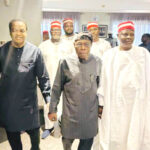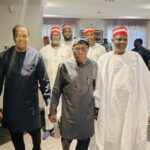Former Governor Nasir El-Rufai of Kaduna State has said the second term of former President Olusegun Obasanjo yielded the most successful in terms of economic growth, job creation, and inflation rate in Nigeria.
Obasanjo governed the country from 1999 to 2007, as the first democratically elected leader of the fourth republic.
El-Rufai, who served as a minister under Obasanjo, said Nigeria, the most populous African country, experienced economic prosperity during his second term extending from 2003 till 2007.
The former governor said Nigeria returned to “proper integrated planning and we also got lucky” at the time.
‘People of Niger and Northern Nigeria are one’, El-Rufai rejects military action
Tinubu appoints El-Rufai’s Commissioner as CBN Deputy gov, fires Emefiele’s deputies
He made this known on Friday during a session at the Africa In the World conference in Stellenbosch, South Africa, as he clamoured for the need for proper planning to aid the economic growth of any country.
“We have a planning commission in Nigeria but it has not been as effective.”
“If you look at Nigeria’s economic trajectory, the most successful four to five-year period of economic growth, job creation, and reduced inflation was the period of the second term of President Obasanjo in 2003 to 2007, when for the first time, the country went back into proper integrated planning and we also got lucky,” he said.
“Oil prices began to rise but we did not waste the windfall because we had planned. We had an excess crude account (ECA) that was based on fiscal rule that any surpluses above a certain benchmark price of crude oil goes to that savings account.
“And with that, we were able to get rid of all our foreign debt.”
El-Rufai said Nigeria’s fiscal vigour was at its best in 2007, such that when the global financial crisis took place in 2008, “Nigeria did not feel anything”.
“Nothing was felt in Nigeria because Nigeria had a big savings account; we had huge reserves and we were able to absorb the shock without any internal problems unlike most countries,” he said.

 Join Daily Trust WhatsApp Community For Quick Access To News and Happenings Around You.
Join Daily Trust WhatsApp Community For Quick Access To News and Happenings Around You.


